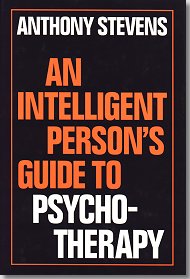| AN INTELLIGENT PERSON'S GUIDE TO | |||
| PSYCHOTHERAPY (1998) | |||
| by Anthony Stevens | |||
| Publishers | |||
| Published by Duckworth, London | |||
| Publishers Description | |||
Psychoanalysis, and its many psychotherapeutic
offshoots, has been a major influence in twentieth century cultural life.
Yet dynamic psychotherapy now finds itself in grave crisis as a result of
the intellectual shipwreck of its founder, Sigmund Freud. Since Freudian
theory has been shown to be largely without empirical basis, what is to
stop the whole psychotherapeutic edifice from collapsing into the
quicksands on which it is built? In this immensely readable and
entertaining overview, Anthony Stevens describes how the major schools of
psychodynamic therapy grew out of the psychology of their charismatic
founders and have subsequently turned into exclusive and mutually hostile
rival 'sects'. Anthony Stevens argues that the best hope for the future
lies in research to determine the positive therapeutic ingredients that
all methods have in common. This, combined with the kind of undogmatic,
open-minded humanity advocated by C.G. Jung, could lead to the adoption of
a new paradigm capable of transcending the difference between them - the
paradigm adopted by the new breed of 'evolutionary psychotherapists'. "Very readable style and great overview of the key figures over
the last 80 years. He interestingly links their own temperaments with the
theories that they created. Availability |
|
||
